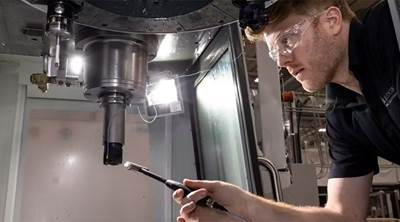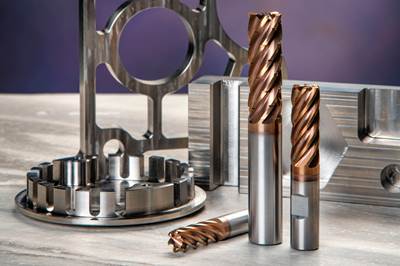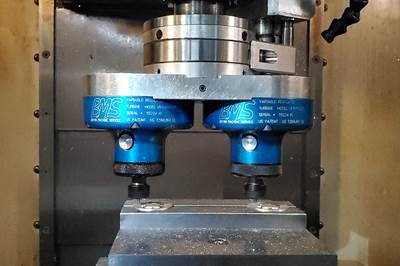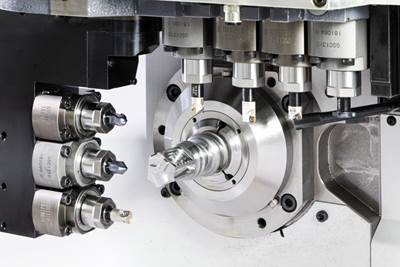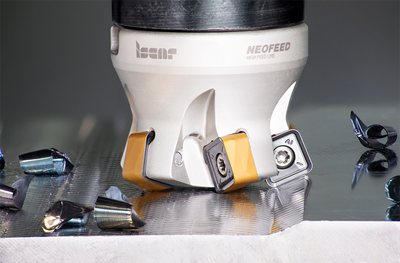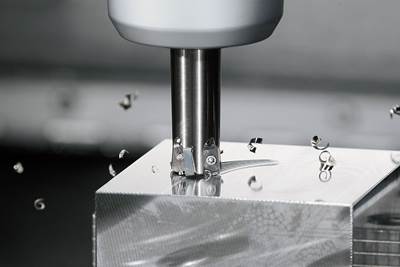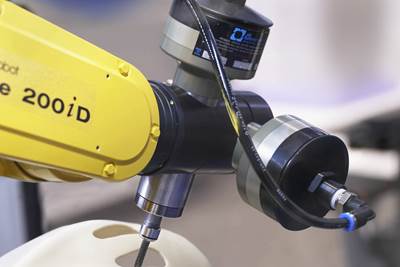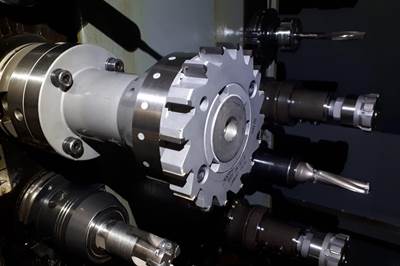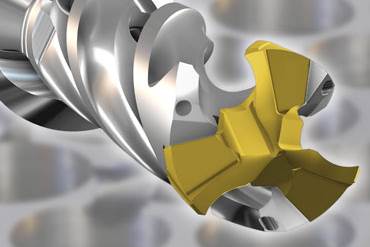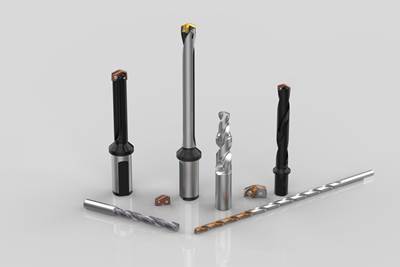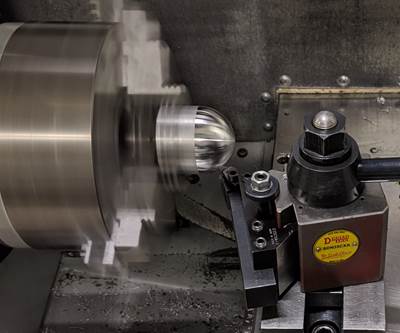Cutting Tools
The broad category of “cutting tools” includes all of the consumable tooling involved in milling, drilling, turning and other lathe and machining center operations. Drills, end mills, taps, reamers and inserts are all included here. Consumable tooling used on certain other types of machine tools is included here as well. Also found here are toolholders and closely related accessories such as angle heads. Supplier pages, FAQs related to cutting and cutting tools can be found here, as well as essential reading on the topic and all of the latest Modern Machine Shop cutting tools coverage.







Latest Cutting Tools News And Updates
Scientific Cutting Tools' Custom, Modified Tooling Boosts Efficiency
PMTS 2025: Scientific Cutting Tools provides customized solutions that address specific geometries, coatings and material requirements.
Read MoreTungaloy Turning Tool Minimizes Machine Downtime
PMTS 2025: ModuMini-Turn enables users to replace tool heads quickly and easily without removing the shank.
Read MoreOmega TMM, Rego-Fix Tooling System Streamlines Presetting
PMTS 2025: Omega TMM and Rego-Fix showcase a tool presetting system that is said to be reliable, innovative and built to rigorous quality control standards.
Read MoreSchwanog Custom Form Milling Tools Produce Complex Profiles, Contours
PMTS 2025: Schwanog’s custom form milling tools are designed to boost productivity and precision, with solutions individually manufactured according to customer drawings.
Read MoreCarmex Thread Mills Feature Ultra-Fine-Grain Carbide
PMTS 2025: Carmex Precision Tools’ FSH solid carbide thread mills are designed for faster, more accurate thread milling in hard and heat-resistant materials up to 65 HRC.
Read MoreAllied Machine and Engineering Drill Provides Extended Tool Life
PMTS 2025: The T-A Pro line is designed to produce well-positioned holes for shorter applications and features a robust design for greater drill depths with longer holes.
Read MoreFeatured Posts
Picking the Right End Mill
Kennametal global product manager Katie Myers explains how cutting tool features can impact machining strategies for different materials.
Read MoreInside the Process of Cutting Tool Recycling
Global Tungsten & Powders, part of the Ceratizit Group, sheds light on the processing steps that convert a shop’s used inserts into new tools and other applications.
Read MoreIndexable Drill Heads Double Profitability
Moving to a robust line of indexable drills enabled this shop to dramatically alter the manufacturing process for a problem part, doubling its profitability.
Read MoreMeasuring Torque, Thrust Force for Smart Drilling Operations
To monitor drilling operations for smart manufacturing solutions, torque and thrust force can be measured.
Read MoreAdvanced CAMs Simplify Programming of Conical Barrel Cutters
Conical barrel cutters have grown in popularity thanks to the large stepovers that reduce the time needed for some finishing processes, but advanced CAM systems can dramatically improve their usefulness.
Read MoreFinding the Right Tools for a Turning Shop
Xcelicut is a startup shop that has grown thanks to the right machines, cutting tools, grants and other resources.
Read MoreFAQ: Cutting Tools
Why is through-tool coolant valuable, and why are shops are seeing greater need for it?
Getting coolant to the cutting edge is critical for any manufacturing application. It helps in cooling the cutting zone, provides very needed lubrication, and can assist in breaking a chip. Many times, external lines are used to splash coolant near the work zone. Long Chips can easily interfere with this delivery method, possibly knocking the lines out of the way. Additionally, when tools need to be changed or indexed coolant lines might be moved for better access to the tool. Then when the line is put back it is never the same as it previously was. Often times there is a give-and-take methodology used to cover areas being machined with this coolant, so all tools get some cooling, but none of them get ideal cooling. A coolant-through tool allows pinpoint accuracy with a specific direction of coolant pointed exactly at the cutting zone.
Through-tool coolant is available on cutters that couldn't offer it before. What has changed in the technology of tool manufacturing to make this possible?
There’s been a big change is the ability to drill small-diameter holes very deep and do this in a production atmosphere. Part of this comes from the drilling machines being able to reach the necessary speeds and holders that provide superior clamping and runout. The other part comes from tools designed specifically for this drilling application.
On a coolant-through tool, material could be added in areas that may need additional strength, allowing for the intersecting coolant ports to be drilled accordingly.
What aspect of tool engineering is responding to greater cutting speed?
Machines and tools seem to have a back-and-forth dance in terms of which is leading. Coatings continue to evolve, with more layers, and different material being used. This is something all tool manufactures are playing with on some level. The changes in coating technology is somewhat more limited, and not as many are playing in this arena. One process that comes to mind is “HiPIMS,” or high-power impulse magnetron sputtering. This process uses microsecond timing of extreme-power pulses. This allows the metal to ionize to nano size particles to be deposited on the tools. This process allows for greater adhesion and coating hardness, while maintaining great lubricity. Additionally, this process has greatly reduced compressive stresses. This reduction allows for smaller edge preps to be used, thus resulting in sharper tools.
Why is diamond used as an industrial cutting tool?
Developments in polycrystalline diamond (PCD) and cubic boron nitride (CBN) have allowed these materials to improve in ways that make them more versatile and cost-effective. Meanwhile, the machining speed and tool life of these tools continue to take machining processes to levels of performance where carbide cannot go.
Through long tool life and fast cutting parameters, the tools increase machine capacity by reducing the frequency of tool replacements and allowing machines to make parts at a greater rate. Meanwhile, the tooling increasingly figures into expert solutions tailored to more demanding applications in various industries.
Source: The New Rules of Cutting Tools - Rule #3: Diamond Shouldn't Be Rare
What are cutting tools made of?
Polycrystalline diamond (PCD), cubic boron nitride (CBN), ceramic, high-speed steel (HHS), cemented carbide or cermet.
Sources: What's Happening With Cutting Tools
Cutting Tools Supplier Categories
- Deburring Tools (Machine Tool Spindle-Mounted)
- Collets, Solid & Master
- Milling Cutters
- Tap Drivers & Attachments
- End Mills
- Tool Presetters
- Boring Tools & Heads for Machining Centers
- Spline Rolling Tools
- Tooling Materials, Ceramics
- Drills
- Drill Bushings
- Diamond Tools
- Mass Finishing Media & Compounds
- Spline Inserts
- Shear Blades
- Threading Tools - Cutting
- Facing Tools/Heads
- Grinding Wheels & Belts
- Thread Chasers
- Boring Tools
- Punching Tools/Dies
- Collets for Toolholding
- Gear Cutting Tools
- Cut-Off Tools/Attachments
- Grooving Tools
- Tool Repair, Coating & Treatment Services
- Thread Whirling Tools
- Key Seating Tools
- Tooling Materials, Carbides
- Broaching Tools
- Taps
- Slotting Saws
- Thread Milling Cutters
- Endworking Tools
- Tool Blanks
- Burnishing Tools (Roller)
- Grinding Wheel Dressing Units
- Retention Knobs
- Drilling Heads/Attachments
- Threading Tools
- Tool Conditioning Equipment
- Honing & Lapping Tools
- Serration Tooling
- Protective Sleeves & Coatings (for Cutting Tools)
- Milling Heads/Attachments
- Tool Condition Monitoring Systems
- Form Tools
- Tool Storage & Handling Systems
- Gear Rolling Tools
- Gundrills
- Burnishing, Honing & Lapping Tools
- Saw Blades
- Die & Mold Components
- Buffing & Polishing Supplies
- Knurling Tools
- Arbors (for Cutters)
- Cold Heading Tools
- Counterbores/Countersinks
- Abrasive Compounds & Slurries
- Marking Tools
- Shaving Tools
- Boring Tools for Turning Machines
- Reamers
- Tooling Systems, Modular and/or Quick-Change
- Drill Chucks
- Toolholders
- Chamfering Tools
- Thread Rolls & Dies
- Threading Tools - Forming
- Inserts, Indexable (Carbide, etc.) & Tool Inserts


















